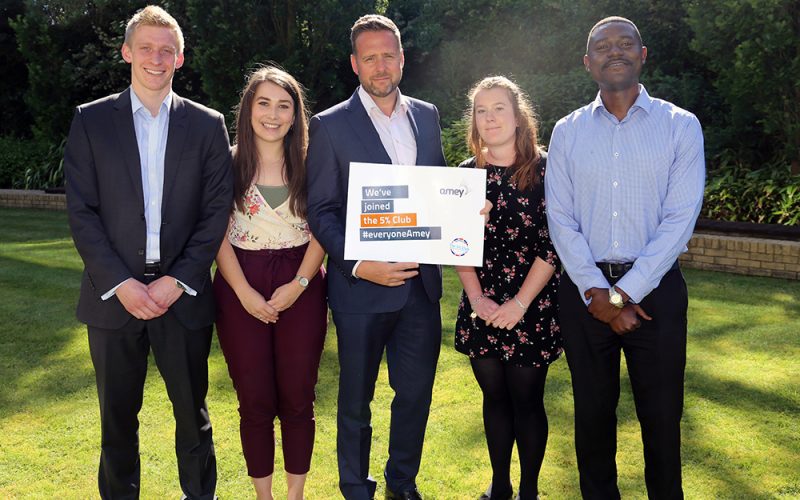Published on: June 22, 2018 at 2:15 PM
We’re already aware of the UK’s productivity and skills shortfall, as well as our lagging economic growth. And with Brexit looming, we’re likely to have new challenges to overcome to remain globally competitive. The best way to do this is to work together to create opportunity, security and a thriving economy the rest of the world wants to do business with.
As one of the UK’s leading engineering, consulting and infrastructure support services organisations, much of the work we do requires using STEM-based skills to come up with innovative solutions for our customers. So, making sure we have a steady, quality flow of talent into our business is crucial for our continued success.
In November 2017, the government pledged to invest an additional £406m in maths, digital and technical education, to address the shortage of science, technology, engineering and maths (STEM) skills. The Confederation of British Industry reported that 40% of employers cited a shortage of STEM graduates as being a key barrier to recruiting appropriate staff. It also says jobs in engineering, science, research, and technology are expected to rise at double the rate of other occupations between now and 2023.
The 5% Club
These are some of the reasons why Amey has joined The 5% Club, a movement of employer-members with a shared voice on addressing youth unemployment and skills shortage to future-proof our collective economic prospects. In signing the charter, we have pledged to work towards a minimum 5% of our UK workforce being enrolled on “earn and learn” programmes within five years. Earn and learn includes graduate and apprenticeship programmes and enabling existing employees to gain new qualifications through the apprenticeship levy.
Apprenticeship levy opens new pathways to existing employees
The apprenticeship levy has taken a bit of criticism since it was launched by the government in 2017. It’s a pot filled by all employers in England with an annual wage bill above £3m contributing 0.5% of that bill for training. For organisations like us, it’s a great opportunity to develop our workforce and gives us scope to invest sustainably in skills for the future. Our Emerging Talent team now works with our business units to identify new ways to do this. Since the levy was launched, over 80 of our existing employees have opted to learn new skills and gain qualifications through funded training, and we aim to enrol a further 200 in 2018 alone.
As an illustration, our environmental services business is using the apprenticeship levy this year to give over 150 employees the opportunity to develop their career skills alongside their day jobs. These employees will gain new skills – funded by the levy – which will give them the opportunity to take on extra responsibilities through sustainable resource management training or a level 2 LGV category C drivers licence.
Earn and learn
Our graduate and apprenticeship programmes are thriving and it’s so exciting to see so many passionate young people bringing fresh thinking and new energy into the business. We currently have almost 200 people on our graduate programme, and we have employed around 90 graduates a year since 2007. Following the launch of our apprenticeship programme in 2010, more than 720 apprentices have joined our ranks, with 164 currently on the programme.
Investing in leaders of the future
These young people will become the industry leaders of the future, the ones who will take our businesses forward, make sure we are resilient, that we adapt and that we are globally known for our innovation. That’s why we actively invest in their careers through ongoing training opportunities to ensure our business continues to thrive.
I’m thrilled to have recently become the Chair of Investors in People. IIP is an organisation driven by a huge sense of purpose to create workplaces which truly engage and invest in their people, realise their potential and fuel the future success of the business to which they belong.
It’s time to collaborate
There has never been a more compelling time for us all to collaborate and share our insights and successes in how we develop our people. At Amey our mission is to create better places to live, work and travel. As part of this we’re committed to transforming the fortunes of young, talented people in the UK and to ensure the UK retains its reputation for innovation and engineering excellence.
This is not something we can achieve alone, and we would like to encourage our customers, competitors and industry peers to join us in attracting, supporting and growing talent, to secure the UK’s position as innovators in the world market.
This article was reproduced with the kind permission of Amey having originally appeared on its website.
Amey’s team of 19,000 works around the clock to design, build, maintain and invest in the UK’s services and infrastructure – making it one of the most diverse companies working across the engineering, facilities management, utilities, transport, environmental services, defence and justice sectors. In fact, nearly everyone in the UK benefits from one of its public services every day.
As a member of the Energy & Utilities Skills Partnership, Amey is also among the collective of leading sector employers that is working together to secure the continual seamless delivery of the wider sector’s services across the UK. The Skills Partnership’s mission is to “ensure a safe, skilled and sustainable workforce provides the essential services that our customers seek and meets the UK’s needs from the energy and utilities infrastructure.”
Pic caption: Amey CEO Andy Milner (centre) with colleague graduates and apprentices (left to right) Chris Lane, Michelle Stephens, Holly Sumpter and Joseph Hayoko
